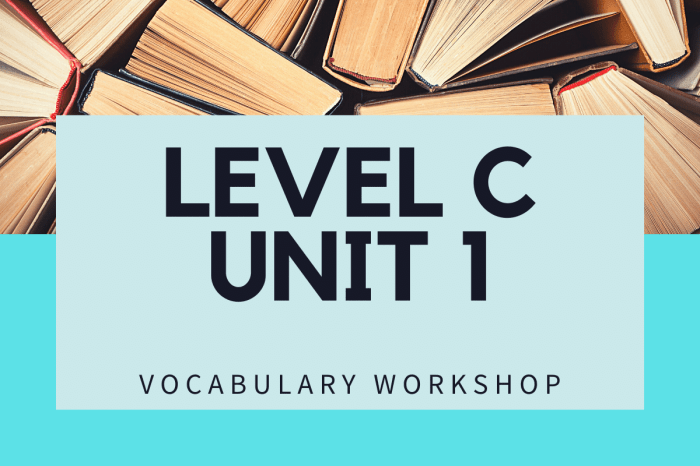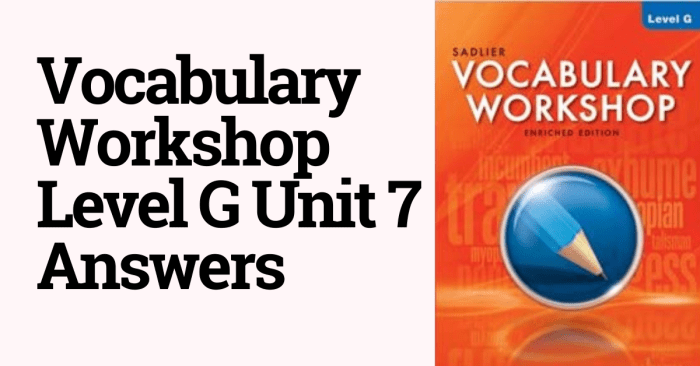Welcome to Vocabulary Workshop Unit 2 Answers Level E, a comprehensive resource designed to enhance your vocabulary development journey. This guide delves into effective strategies for expanding your vocabulary, explores various assessment methods, and provides guidance on teaching vocabulary in context.
Our experts have meticulously crafted this guide to empower you with the knowledge and tools necessary to master vocabulary building. Whether you’re a student, teacher, or lifelong learner, this guide will provide valuable insights and practical tips to elevate your vocabulary skills.
Vocabulary Development Strategies: Vocabulary Workshop Unit 2 Answers Level E
Expanding vocabulary is crucial for effective communication and academic success. Several techniques can enhance vocabulary development, including:
Reading Widely
Reading exposes learners to a wide range of vocabulary in context. Encourage students to read diverse genres and texts to encounter new words and their usage.
Flashcards
Flashcards are a classic tool for memorizing vocabulary. Students can create their own flashcards with new words and their definitions or synonyms.
Word Games, Vocabulary workshop unit 2 answers level e
Word games such as Scrabble, crossword puzzles, and word searches engage learners in a fun and competitive way to expand their vocabulary.
Repetition and Spaced Retrieval
Regular repetition and spaced retrieval techniques enhance vocabulary retention. Review new words at increasing intervals to strengthen their recall.
Vocabulary Assessment Methods
Assessing students’ vocabulary knowledge is essential to monitor progress and guide instruction. Methods include:
Standardized Tests
Standardized tests provide a standardized measure of vocabulary proficiency. However, they may not capture all aspects of vocabulary knowledge.
Cloze Exercises
Cloze exercises require students to fill in missing words in a text, testing their understanding of vocabulary in context.
Vocabulary Journals
Vocabulary journals allow students to record new words they encounter, along with their definitions, synonyms, and usage examples.
Advantages and Disadvantages
Each assessment method has its advantages and disadvantages. Consider the purpose of the assessment, the students’ proficiency level, and the time constraints when selecting a method.
Teaching Vocabulary in Context

Teaching vocabulary in context is more effective than in isolation because it:
Enhances Comprehension
Students can better understand the meaning of new words when they encounter them in authentic texts or situations.
Promotes Retention
Learning vocabulary in context creates meaningful connections between words and their usage, improving retention.
Strategies
Strategies for teaching vocabulary in context include:
- Using real-world texts
- Creating scenarios and simulations
- Incorporating vocabulary into discussions and writing
Differentiated Vocabulary
Students have varying vocabulary needs. Differentiation strategies include:
Tiered Vocabulary Lists
Tiered vocabulary lists provide different sets of words based on difficulty, allowing students to focus on words appropriate for their level.
Multiple Levels of Support
Provide multiple levels of support, such as scaffolding, visual aids, and peer support, to meet the needs of diverse learners.
Ongoing Assessment
Ongoing assessment helps monitor student progress and adjust instruction accordingly.
Technology and Vocabulary Learning

Technology can enhance vocabulary learning:
Benefits
- Access to vast online dictionaries and resources
- Interactive vocabulary apps and games
- Real-time feedback and tracking
Challenges
- Digital distractions
- Lack of face-to-face interaction
- Ensuring equitable access
Guidance
To integrate technology effectively, consider:
- Selecting high-quality digital resources
- Providing guidance and support for students
- Balancing digital and non-digital activities
Expert Answers
What are some effective strategies for expanding vocabulary?
Reading widely, using flashcards, engaging in word games, and incorporating vocabulary into daily conversations are all effective strategies for expanding vocabulary.
How can I assess my students’ vocabulary knowledge?
Various methods can be used to assess vocabulary knowledge, including standardized tests, cloze exercises, vocabulary journals, and oral assessments.
Why is it important to teach vocabulary in context?
Teaching vocabulary in context helps students understand the meaning and usage of words in real-world situations, fostering deeper comprehension and retention.